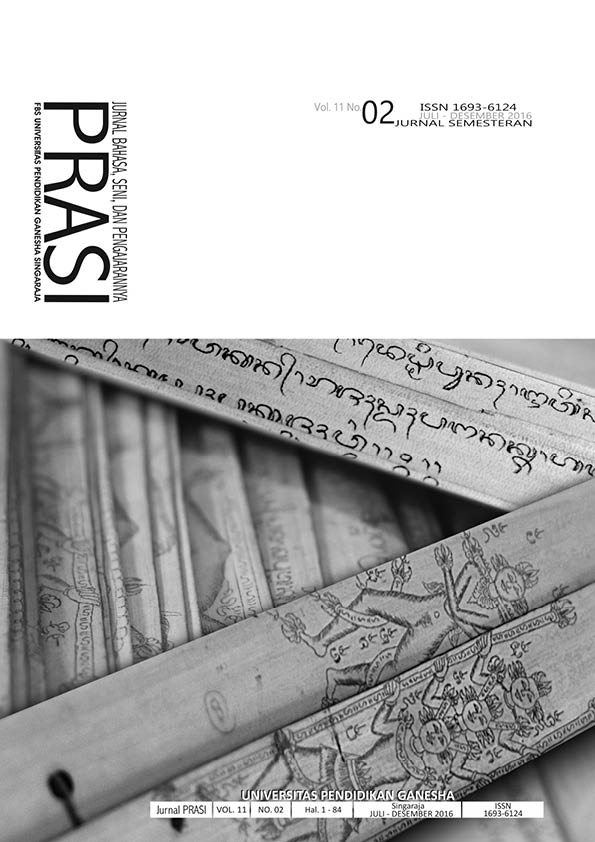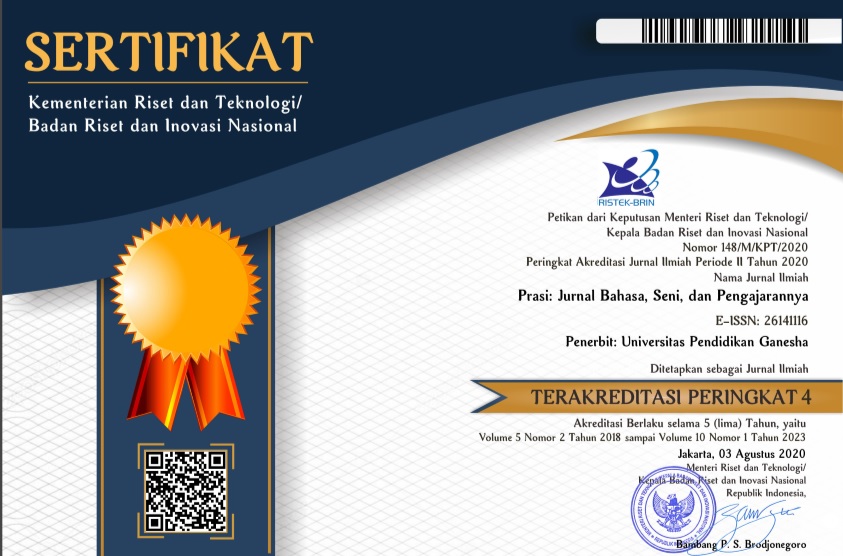KEBUTUHAN AKAN MUATAN BUDAYA LOKAL DALAM SUPLEMEN PERANGKAT PEMBELAJARAN BAHASA INGGRIS UNTUK MENUNJANG PENGEMBANGAN KARAKTER BANGSA
DOI:
https://doi.org/10.23887/prasi.v11i02.11132Abstract
Need analysis is conducted to get the data about the Balinese local culture that could be accommodated in the development of supplementary instructional devices for teaching English in Class VII in the form of material (textbooks), electronic media, and assessment instrument. The data is collected through documents study, questionnaires, and interviews by involving English teachers and seventh grade students from nine secondary schools in the District of Buleleng shows that supplementary instructional devices which contain of Balinese local cultural need to be developed. The panel analysis which involved the expert of Balinese local culture shows the findings that there are some local culture such as brahman, jemet, brahmacari, maître, lascarya, segilik seguluk, menyama braya, selulung sebayantaka, pasidikaran, jengah, tri kaya parisudha, jemet, swadharma (catur asrama), tat twam asi, rwa bhineda, menyama braya, tri hita karana, de koh ngomong, tri hita karana, lascarya, satya laksana, kesenian bali, pramana, jele melah wenang sambat, madue idep, maitri, karuna, dan bani meli bani ngadep could be accommodated to develop the products and they are expected to be able to support the development of national character building, such as religious, discipline, curiousity, nationalism, hard work, responsibility, social care, self confident, logical thought, critical thinking, creative, innovative, love reading, and independent. Key words: assessment, local culture, instructional material, electronic media, nation character build-ing, instructional devices ABSTRAK
Dalam rangka pengembangan suplemen perangkat pembelajaran mata pelajaran Bahasa Inggris Kelas VII dalam bentuk materi (buku teks), media elektronik, dan perangkat asesmen yang meng-akomodasi budaya lokal Bali untuk menunjang pengembangan karakter bangsa dilaksanakan analisis kebutuhan dengan melakukan analisis dokumen, wawancara, pengisian angket dan panel analisis. Data dikumpulkan dengan melibatkan guru Bahasa Inggris dan siswa kelas VII dari 9 SMP di Kecamatan Buleleng serta pakar di bidang budaya lokal Bali. Berdasarkan panel analisis ditemukan budaya lokal seperti brahman, jemet, brahmacari, maître, lascarya, segilik seguluk, menyama braya, selulung sebayantaka, pasidikaran, jengah, tri kaya parisudha, jemet, swadharma (catur asrama), tat twam asi, rwa bhineda, menyama braya, tri hita karana, de koh ngomong, tri hita karana, lascarya, satya laksana, kesenian bali, pramana, jele melah wenang sambat, madue idep, maitri, karuna, dan bani meli bani ngadep dapat diakomodasikan dalam pengembangan perangkat pembelajaran. Pengakomodasian tersebut diharapkan akan dapat mengembangkan karakter siswa seperti religius, disiplin, rasa ingin tahu, semangat kebangsaan, kerja keras, tanggung jawab, cinta damai, jujur, toleransi, kerja sama, bersahabat/komunikatif, peduli lingkungan, peduli sosial, percaya diri, berpikir logis, kritis, kreatif, dan inovatif, gemar membaca, mandiri, kerja keras, menghargai prestasi, dan patriotik. Kata kunci: asesmen, budaya lokal, materi ajar, media elektronik, pengembangan karakter bangsa,
perangkat pembelajaran
Downloads
Published
2016-12-31
Issue
Section
Articles
License
Authors who publish with Prasi agree to the following terms:- Authors retain copyright and grant the journal the right of first publication with the work simultaneously licensed under a Creative Commons Attribution License (CC BY-SA 4.0) that allows others to share the work with an acknowledgment of the work's authorship and initial publication in this journal
- Authors are able to enter into separate, additional contractual arrangements for the non-exclusive distribution of the journal's published version of the work (e.g., post it to an institutional repository or publish it in a book), with an acknowledgment of its initial publication in this journal.
- Authors are permitted and encouraged to post their work online (e.g., in institutional repositories or on their website) prior to and during the submission process, as it can lead to productive exchanges, as well as earlier and greater citation of published work. (See The Effect of Open Access)


.png)
.png)









